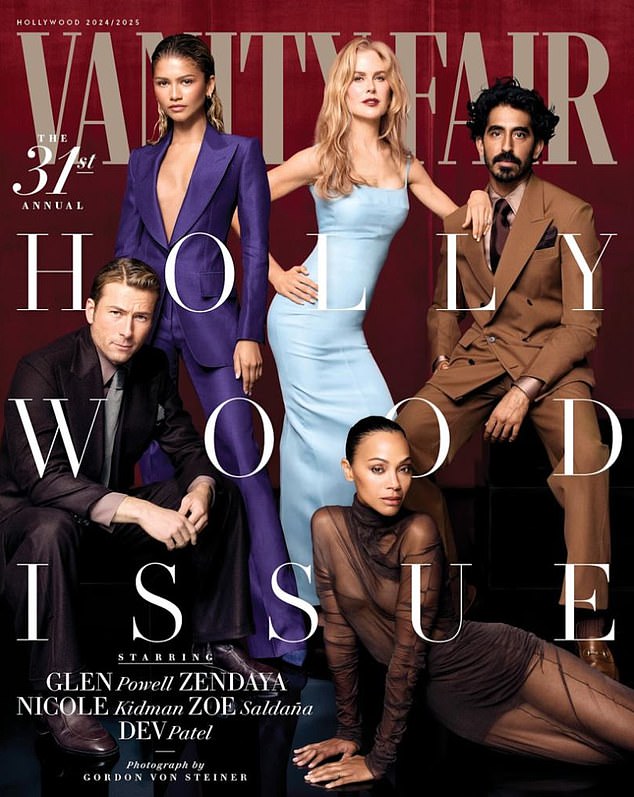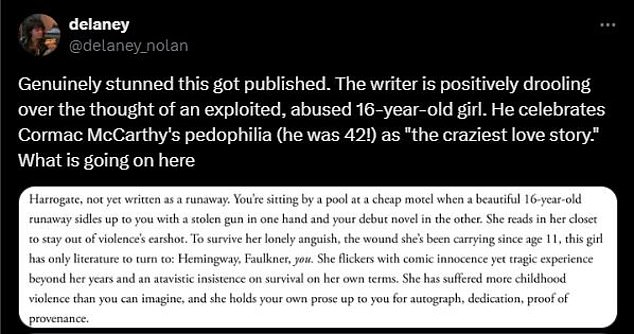Vanity Fair is under fire for “glorifying” and “romanticizing” author Cormac McCarthy’s sexual relationship with his underage “muse.”
The American novelist’s secret minor muse was revealed in a piece yesterday, more than a year after his death from prostate cancer.
The Vanity Fair article’s characterization of the highly questionable relationship has sparked outrage on social media.
The article, written by Vincenzo Barney, centers on Augusta Britt, now 64, who talks about her relationship with McCarthy and their first meeting at a hotel pool in Tucson, Arizona, when she was a troubled foster child.
Britt described how she approached McCarthy, then 42, with a copy of his debut novel, The Orchard Keeper, looking for his autograph.
Britt explained at the time that she had no intention of starting a relationship with him, but described how their relationship developed and how she believes he “saved her life.”
But the outlet has come under fire for the author’s description of their controversial relationship. Their meeting marked the beginning of what the article describes as a “crazy” and unconventional love story.
“Imagine for a moment: you’re an underappreciated literary genius who doesn’t even get to the point before it goes out of print,” the author wrote.
You’re sitting by a pool in a cheap motel when a beautiful 16-year-old runaway approaches you with a stolen gun in one hand and your debut novel in the other. She brims with comic innocence, yet tragic experiences beyond her years, and an atavistic drive to survive on her own terms.”
Vanity Fair has been criticized for publishing an article that many condemned for glorifying what critics say was the exploitation of a 16-year-old girl by the late author Cormac McCarthy

Readers disapproved of the piece, claiming the author was trying to romanticize the highly questionable relationship, sparking outrage on social media
The Vanity Fair piece characterizes Britt as McCarthy’s “secret muse.”
“And just like that, with the impatient grandeur of coincidence and chance, you meet your muse, a moral hero, a girl with a stuffed cat named John Grady Cole,” Barney wrote.
In the interview, Britt reflects on how McCarthy took her away from her difficult life and portrays him as a kind of savior figure.
“Every time McCarthy was back in town, he would see Britt and leave her cab or phone money between the third and fourth Wall Street Journal at the Denny’s on Miracle Mile, she says,” he wrote.
‘He was 43, she was 17. The image is startling and possibly illegal. At the very least, it raises questions about inappropriate power dynamics and the specter of premeditated grooming. But not against Britt, who in her young life was the victim of unspeakable violence by many men, then and now.’

The article, written by Vincenzo Barney (pictured), centers on Augusta Britt, now 64, who talks about her relationship with McCarthy and their first meeting at a hotel pool in Tucson, Arizona, when she was a troubled foster child.
But critics say that while Britt’s perspective may be understandable given her difficult upbringing, the author and publication irresponsibly ignore key ethical and legal issues in their story.
He writes that the FBI even came after McCarthy after the girl’s family was contacted.
“Although, according to Britt, problems immediately arose in the form of the Federal Bureau of Investigation,” Barney wrote. “…And then the police started questioning people at the motel. So they had his license plate and the make of his car. And at that time he was wanted for statutory rape and the Mann Act. But he was fearless. I think he actually liked it,” she grins.’
Social media users have expressed disgust at what they see as the romanticization of a deeply problematic power dynamic.
“Really baffled that this was published,” one commenter wrote, “the writer is definitely drooling at the thought of an exploited, abused 16 year old girl. He celebrates Cormac McCarthy’s pedophilia (he was 42!) as ‘the craziest love story’. What’s going on here.’
But users not only criticized the morality of the article’s tone, they also criticized the writing style.
“That vanity essay is a train wreck,” wrote another user on with statements like ‘the pure perfume between the open thighs of a book’ in 2024.’
“Cormac McCarthy’s muse article makes me cry,” another user commented.

Social media users have expressed disgust at what they see as the romanticization of a deeply problematic power dynamic
“It’s not enough that there was a long line of men who abused Augusta Britt or thought their input was a funny story to tell around the fire, now this author comes along and loves her abuse as a window into his idol. grim.’
Other news media also condemn the author’s work.
“Unfortunately, the impact of Barney’s good work is offset by one inescapable fact: he can’t write,” writes a review in the Telegraph.
‘His prose is terrible, overwrought, nonsensical. It’s so bad it’s not even funny,” the article continues. ‘It starts badly; the first paragraph actually reads, “I’m about to tell you the craziest love story in literary history.” And before you search the canon for a glamorous refutation, I must warn you: its superiority is decisive” – and is rapidly getting worse.”
Perhaps more disturbing than the garbled prose, Barney appears to treat McCarthy’s pedophile interest in the vulnerable teenager as a great love story. It’s hardly an incredible attitude to adopt in 2024, seven years after the #MeToo scandal first broke and seventy years after the publication of Lolita.”
Vanity Fair and the article’s author, Vincenzo Barney, were contacted for comment but did not respond at time of publication.


